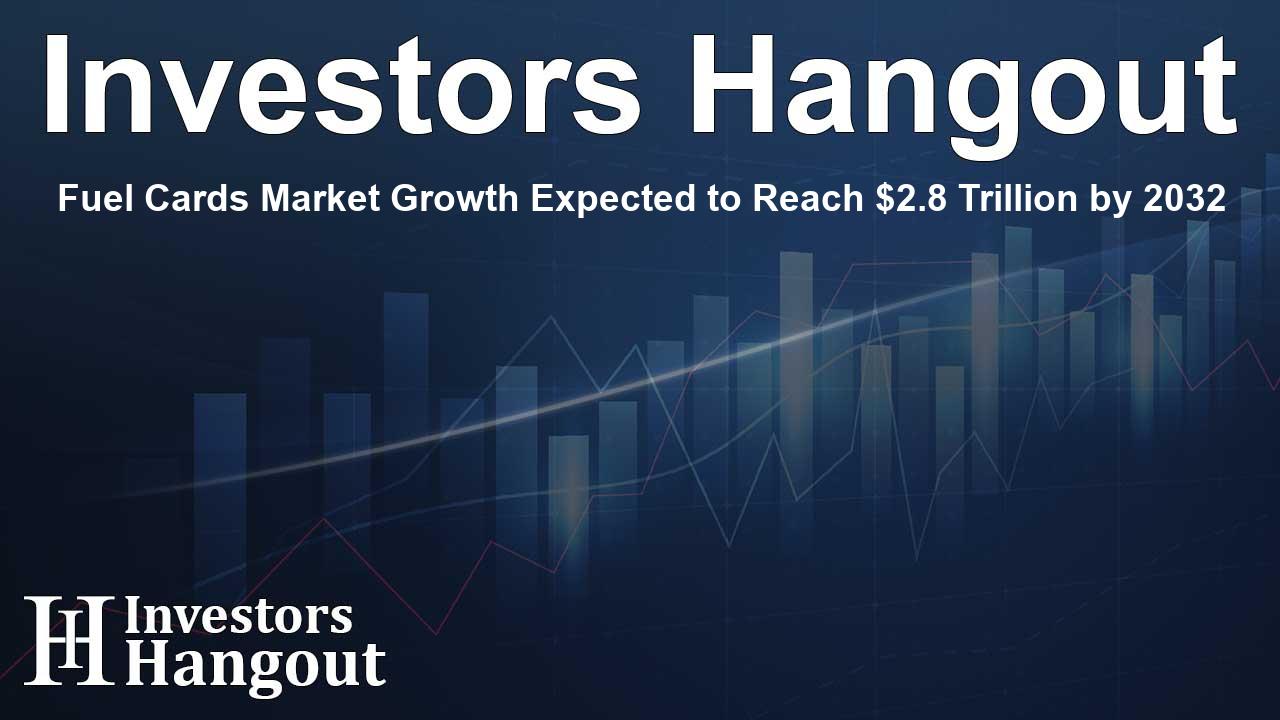Fuel Cards Market Growth Expected to Reach $2.8 Trillion by 2032

The Future of the Fuel Cards Market
The fuel cards market is on the brink of significant expansion, projected to grow from $735 billion in 2022 to an astonishing $2.8 trillion by 2032. This remarkable trajectory, marking a CAGR of 14.4% from 2023 to 2032, is driven by several factors that highlight the need for improved fuel management solutions globally.
Drivers of Market Growth
One of the primary catalysts for this growth is the increasing necessity for enhanced fuel management systems that allow businesses and individuals to manage their fuel expenses efficiently. The proliferation of digital transaction solutions has further accelerated this trend, making fuel purchasing more accessible. Additionally, the surge in banking and financial service adoption in emerging markets is creating fertile ground for fuel card utilization.
Universal Segment Leads the Way
The universal fuel card segment emerged as a leader in market share in 2022, celebrated for its versatility and ease of use. These cards can be utilized across numerous service stations without the constraints of brand affiliation, providing a streamlined purchasing experience. As businesses and consumers alike gravitate towards this solution, growth in the universal segment is expected to remain robust.
Merchant Segment Poised for Rapid Growth
While the universal card segment holds a commanding position, the merchant fuel card segment is emerging as a dynamic player anticipated to witness a CAGR of 15.7%. Convenience stores and gas stations are increasingly integrating fuel card solutions into their payment frameworks, enhancing transaction efficiency, and delivering added value to their customers. This shift highlights a significant consumer trend favoring flexible and efficient purchasing options.
Application Areas of Fuel Cards
The fuel refill application stood out in 2022, accounting for the majority market share. Fuel cards simplify fuel purchase processes, enabling users to transact efficiently and conveniently. However, the 'Others' segment is projected to grow at an impressive CAGR of 16.2%, as businesses integrate fuel card solutions into broader fleet management operations, encompassing both fuel expenses and maintenance costs.
Regional Insights
Europe retained the largest market share for fuel cards in 2022, bolstered by a robust infrastructure that supports high adoption rates across diverse industries like logistics and transportation. The region benefits from comprehensive networks of fuel stations and regulatory frameworks that promote the use of fuel cards, making it a model for other regions.
Key Industry Developments
Recent developments in the industry also point toward evolving consumer preferences and increased market activity. For instance, a notable collaboration between RBL Bank and Indian Oil Corporation in September 2024 led to the launch of the 'Xtra Credit Card', which delivers significant fuel savings and is expected to boost credit card growth significantly. Similarly, WEX's partnership with EG America is set to revolutionize the savings landscape with pre-negotiated fuel discounts nationwide.
Strategic Industry Moves
In another strategic move, Shell Oil Company took a bold step by acquiring MSTS Payments, enhancing its fuel card acceptance network significantly. This acquisition is set to streamline transactions for Commercial Road Transport (CRT) companies across thousands of locations throughout North America, reinforcing Shell's competitiveness in the fuel card space.
Benefits for Stakeholders
The benefits of this evolving market landscape are extensive. Stakeholders can gain invaluable insights through quantitative analytics on market segments, enabling them to identify opportunities for growth. Furthermore, an in-depth understanding of market dynamics—including drivers, restraints, and emerging trends—will empower decision-makers to strategize more effectively in an increasingly competitive environment.
Conclusion
In conclusion, the fuel cards market presents a compelling growth narrative supported by digital transaction innovations, shifting consumer behaviors, and strategic industry initiatives. As this dynamic landscape continues to evolve, it will undoubtedly yield new opportunities for businesses and consumers alike, making it a crucial area for ongoing market analysis and investment.
Frequently Asked Questions
What is the projected value of the fuel cards market by 2032?
The fuel cards market is projected to reach $2.8 trillion by 2032, with significant growth anticipated.
Why are universal fuel cards popular?
Universal fuel cards are favored for their broad acceptance at various service stations, providing users with flexibility and convenience.
What application area dominated the fuel cards market in 2022?
The fuel refill application area held the largest market share in 2022 due to its essential role in everyday fuel purchases.
Which region has the highest market share in fuel cards?
Europe dominated the fuel card market in 2022, supported by its established infrastructure and high adoption rates.
What are the benefits of fuel cards for businesses?
Fuel cards offer businesses improved fuel expense management, streamlined transactions, and integration with fleet management systems.
About Investors Hangout
Investors Hangout is a leading online stock forum for financial discussion and learning, offering a wide range of free tools and resources. It draws in traders of all levels, who exchange market knowledge, investigate trading tactics, and keep an eye on industry developments in real time. Featuring financial articles, stock message boards, quotes, charts, company profiles, and live news updates. Through cooperative learning and a wealth of informational resources, it helps users from novices creating their first portfolios to experts honing their techniques. Join Investors Hangout today: https://investorshangout.com/
Disclaimer: The content of this article is solely for general informational purposes only; it does not represent legal, financial, or investment advice. Investors Hangout does not offer financial advice; the author is not a licensed financial advisor. Consult a qualified advisor before making any financial or investment decisions based on this article. The author's interpretation of publicly available data shapes the opinions presented here; as a result, they should not be taken as advice to purchase, sell, or hold any securities mentioned or any other investments. The author does not guarantee the accuracy, completeness, or timeliness of any material, providing it "as is." Information and market conditions may change; past performance is not indicative of future outcomes. If any of the material offered here is inaccurate, please contact us for corrections.